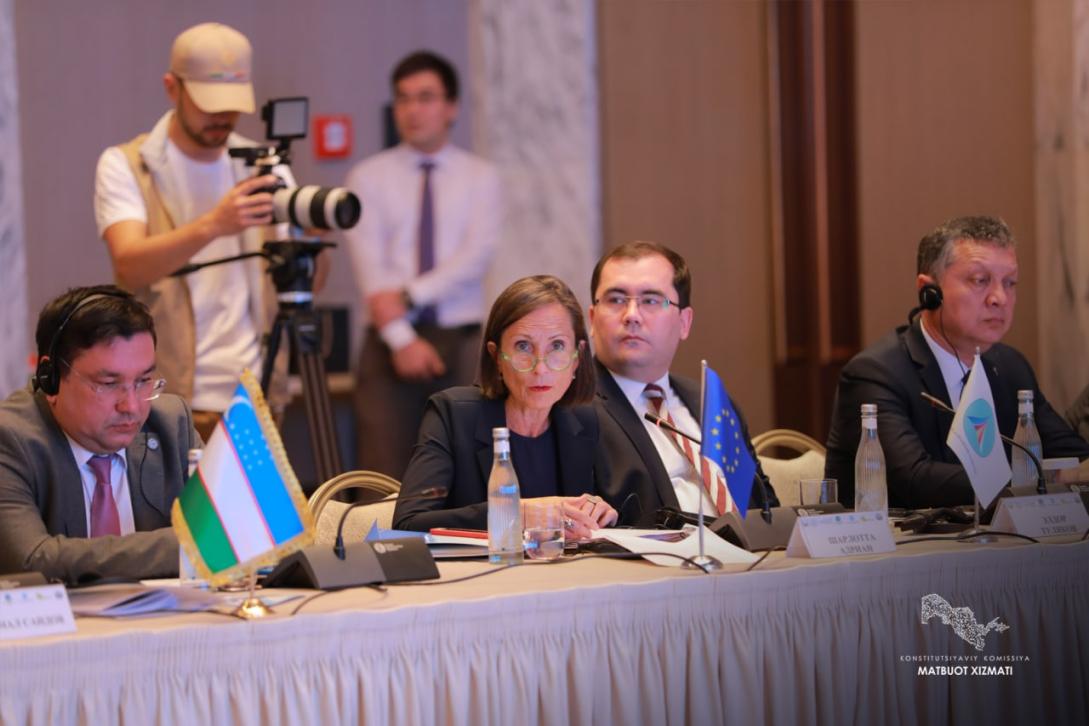EU’s Support to the Democratic Transformation in Uzbekistan

Assalomu Alaykum, good morning!
Dear Professor Saidov, Dear Ladies and Gentlemen,
It is a pleasure for me to be here and thank you for again inviting the EU to take part in such important discussions. This is already for the fourth time and last was during the Round table in Brussels. Our Managing Director, Luc Devigne intervened and expressed our EU commitment and support to the on-going reforms.
So let me on behalf of the EU reiterate that we are here to support Uzbekistan’s reforms. We support the Democratic reforms are at the centre of the transformation programme, initiated by President Mirziyoyev. The EU’s objective is to support Uzbekistan’s transition to a pluralistic democratic system, based on the rule of law, universal values of human rights, elimination of all forms of discrimination, independence of the judiciary and a flourishing civil society. This is also clearly reflected in our Multi Annual Indicative Programme 2021- 2027 drafted together with all the stake-holders in Uzbekistan: effective governance, which will support democratic governance reforms, the rule of law, human rights and improved public services will be one of the three priorities of cooperation with Uzbekistan.
Support to democratic reforms is also reflected and enshrined and in the EPCA, the negotiations for which were happily concluded this summer. This is in fact at the heart of the enhanced partnership, which enlarges our cooperation with Uzbekistan. The same goes for GSP+ regime which foresees unilateral trade preferences for Uzbekistan is also meant to support Uzbekistan’s democratic transition by ratifying and implanting the 27 conventions in the domain of human rights, labour rights and environment. And this is not a one –off, the monitoring system will support the actual implementation of the ratified conventions.
Speaking about constitutional reforms, so I will not deepen into the content of possible amendments to the Constitution, because in the EU there is a variety of constitutional models. There is no common European “best model” for constitutional amendment, much less any common binding legal requirements. Neither has there been any attempt so far at articulating any common European standards. I am also grateful to my colleagues – the speakers – Roli Astana and Munir Mamazade – for sharing fundamental knowledge on the best practices on social and human rights defended by constitutions, which I fully subscribe.
What the EU can do is draw attention to some general recommendations that are based on relevant international human rights and rule of law standards and OSCE commitments, as well as provide assistance in case of need.
Whatever is decided in the process of constitutional amendments, participatory democratic governance, the rule of law, fundamental rights and freedoms must be preserved, and separation of powers must be maintained with checks and balances among different institutions.
Of course the content is key, but the process is also vital. This is the very basis of democratic governance. The OSCE/ODIHR and the Venice Commission have always been of a view that constitutional amendments should be adopted through an effective, thorough, and inclusive process. It is important to ensure that the constitutional reform process allows for informed, inclusive and meaningful discussions within and outside the Parliament, with the participation of all relevant stakeholders. including non-parliamentary political parties, civil society, and the wider public. The purpose of the proposed changes should be clear not only to the institutions but to citizens as well. The process of elaboration of proposals has to be transparent and inclusive The commission in charge of the preparation of the text of the reform should not only notify that it has taken note of the proposals, but to demonstrate that it takes into account different positions and opinions.
The Venice Commission assesses any constitutional change in the light of three main principles: democracy, rule of law and respect for human rights. Any reforms are assessed in the light of the principle of separation of powers, respect for Human Rights and independence of the judiciary.
I know it has been said before, in fact I have also mentioned it previously, the EU is funding a regional Central Asia Rule of Law Programme in the partner countries Kazakhstan, Kyrgyzstan, Tajikistan, Turkmenistan and Uzbekistan, which aims to reinforce human rights, rule of law and democracy in accordance with European and other international standards by offering assistance to reform processes, based on a demand-driven approach. The Programme is open to all Central Asian countries wishing to benefit from the Venice Commission expertise. One of the objectives of the programme relevant to our today’s discussion is support to the development and adoption by the parliaments of relevant legislation in the field of rule of law, separation of powers and the judiciary, in line with international standards.
Therefore, I would wish to encourage our Uzbek colleagues to utilize the expertise of the Venice Commission in undertaking ambitious reforms. The Government of Uzbekistan has already established a very good level of cooperation with the Venice Commission and was provided with the needed advice. The Venice Commission has an important tool in this field — The rule of law checklist, adopted in 2016, which provides a comprehensive list of criteria which could be used as reference in conducting reforms by the countries of the region.
Let me conclude with a single statement: We, the EU are committed for the long term and we are looking forward to support and accompany Uzbek reform agenda, as partners.
I wish you a fruitful discussion
Katta Rahmat.





